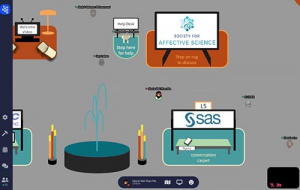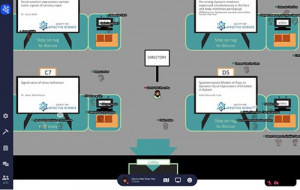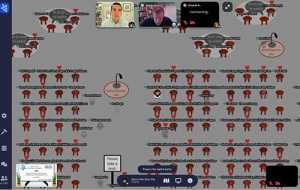Society for Affective Science Conference

Virtual conference lobby
Graduate Old Members’ Trust Report – Gloria Wai Shan Ma, DPhil in Experimental Psychology
I presented my doctoral research project titled “Social Sharing of Emotion During the Collective Crisis of COVID-19” at the 8th Society for Affective Science (SAS) Annual Conference hosted by Virtual Chair in Gather.Town between 13th and 16th April 2021. The Annual Conference had a record-breaking number of abstract submissions this year, with scholars from all around the world showcasing their newest affective science research.
People usually have an urge to talk about their feelings with someone else after an emotional experience (i.e., social sharing of emotion). In times of distress, such as after a major collective crisis strikes, people are motivated to engage in social sharing to make themselves feel better by receiving support from others. However, previous studies have documented mixed results regarding the effectiveness of social sharing at emotional recovery. More empirical work is thus needed to supplement the existing literature, and the current COVID-19 pandemic offers an excellent research context. To gain a fuller picture of the dynamics of the effects of social sharing, my collaborator and I collected and analysed Twitter and online survey data. On the third day of the Conference, I presented the key findings of this collaboration work in the Presentation Room: Social sharing appears to be an adaptive strategy that helps cope with the current health crisis since it enhances positive emotions and reduces negative emotions. In the Q&A sessions, I met other researchers who shared similar research interests and exchanged our opinions about this topic and the use of dual methods.

Virtual Presentation Room
The virtual format of the Conference allowed a full 24-hour programme of activities. Besides my own presentations, I also enjoyed attending the flash talks in the Plenary. I found Gal Sheppes’s talk particularly inspiring. Gal is a professor at Tel Aviv University in Israel, who specialised in emotion regulation. He argued that researchers of this field should not limit their attention to the question of whether a regulatory strategy is inherently adaptive or not (the “Good & Bad” problem) because its consequences can vary across contexts. For example, distraction and reappraisal have been viewed as a “bad” and a “good” strategy respectively because the latter has been found to be more effective in the long term. However, there is evidence that people tend to switch from reappraisal to distraction when dealing with highly negative information, and this switch makes them feel better than adhering to reappraisal. This finding paves the way for Gal’s second argument: Researchers should not focus on a single regulatory stage (the “Here & Now” problem) because people actually spontaneously monitor their regulatory choice and are capable of switching to a different one when they realise another offers better cost-benefit balance.

Virtual Plenary
Gal’s talk has provided me with a fresh perspective on the findings of my own project: Social sharing appearing to be an adaptive response to the current pandemic does not necessarily mean that it is a “good” regulatory choice at all times. Crises studied in prior research have mostly been an acute stressor—for example, the September 11 attacks started and ended within the same day. Profuse talking, despite its psychosocial benefits, inevitably incurs the cost of reactivating undesirable emotions and thoughts associated with the event that has already ended. On the other hand, the COVID-19 pandemic is a chronic stressor and social distancing rules have been in effect for a long period. These unprecedented circumstances may have caused the mere act of interacting with someone else already very emotionally beneficial in addition to the effects of sharing emotions.
I was very honoured to be informed that the abstract of my project will be published in a supplement of SAS’s Affective Science journal. This is a great recognition of my research efforts and outputs, encouraging me to work on a full-length manuscript and offer the public further insights into the effects of social sharing. All in all, the Conference has let me taste the happiness of intellectual exchange with other scholars. I am proud to be a psychologist and will continue contributing to academia.
Find out more about the range of travel grants and scholarships available to assist Univ students on our Travel Grants page or read further travel reports.
Published: 5 May 2021
